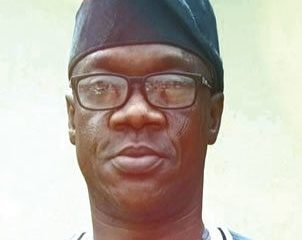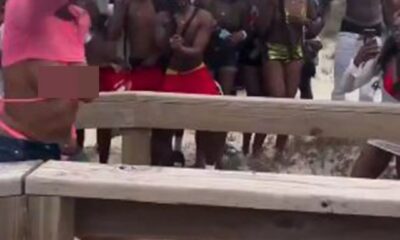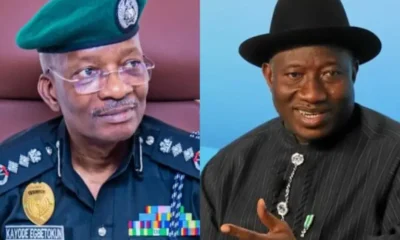News
OPINION: What Is Killing Our Obas?
Published
3 months agoon
By
Editor
By Suyi Ayodele
It is a sacrilege to say an oba is dead in Yorubaland. But two obas were killed by suspected kidnappers last week in Ekiti State. Their remains are on display everywhere on the Internet. The obas were three on that journey of fate, but one of them escaped by the grace of his God and of his ancestors, the oneaas who left the seat for him to sit. One of the killed obas, the Elesun of Esun Ekiti, Oba Babatunde Ogunsakin, was a maternal cousin to me. The second oba, the Olumojo of Imojo Ekiti, Oba Olatunde Olusola, came all the way from Oye Local Area to be killed by the bullets of the assailants far from his forefathers’ ‘shrine’. The Alárà of Àrà Ekiti, Oba Adebayo Fatoba is the one who escaped. Rumours initially had it that he dissolved into air and landed in safety, but the monarch said that is not true. He said what is true is that he confronted the assailants who rained bullets on him but God did not allow the bullets to enter his body. The matchete used on his leg several times also bounced off. I love Alárà’s God. I recommend that all obas in Yorubaland should worship and serve that God.
I have a cousin. He is a senior lecturer in one of the universities in the South-West. He was programmed to die and be buried in 1976 or thereabouts. Providence, through the instrumentality of Ifa, saved him. His father, our father, the late Baba Daniel Falade, was to travel to Lagos. My cousin, who was barely seven years old, said he would follow him; a request that was turned down. Baba Falade woke early in the morning to embark on the journey. He checked to see that the little boy was fast asleep. Unknown to him, my cousin kept a vigil, but pretended to be asleep. As Baba stepped out, my cousin sneaked out and tip-toed behind him. As the old man made to enter the vehicle that would convey him to Lagos, he noticed that he was being followed. He found out that it was my cousin. The old man changed his mind, and decided to take the boy along with him. But being the best of Babalawos of his era, he begged the driver and other passengers to give him a little time to consult Ifa if there would be consequences if he took the boy along with him. Ifa said there would be consequences but those could be averted if a sacrifice was made to Ògún, the god of iron. The sacrifice was carried out and the duo travelled to Lagos.
After about six weeks in Lagos, father and son set out on their return journey to the village. The child was on the far back seat of the car and Baba Falade on the front seat with another passenger and the driver. At Osu in Osun State, the driver stopped so that the passengers could buy akara. Baba Falade bought akara and bread for my cousin. Then he made a request. He asked that the boy should be brought to the front seat so that he could feed him on his laps. What a doting father! The request was granted and the journey continued. A few minutes later, a lorry which was following their vehicle on top speed lost its brakes. The lorry hit the vehicle from behind and cut it into two halves. All the four passengers at the back seat perished on the spot. My cousin and Baba Falade were unhurt on the front seat where they were. Baba Falade praised his Babalawos, his Babalawos also praised Ifa. The cousin I am talking about here is an associate professor today. Ifa said there would be consequences but those could be averted with just a mere sacrifice to Ògún. That is the culture they asked us to throw away. They took Òpèlè from us and gave us the rosary. Now the real keepers of our culture die cheaply in the hands of bandits.
READ ALSO: OPINION: Restructure Nigeria Before We All Die
Today is Tuesday. I must be in the church later for Bible Study. Before I am accused of venerating Ifa above God, let me tell you yet another story of how Ifa saved another situation. Of course, the main character here is also Baba Falade. He told us the story countless times. That particular year, there was no rain in the entire Egbeobaland. All the obas in the localities converged on the palace of the Elekole of Ikole in Ekiti State. They invited all the Babalawos and Alámóèkús to find a solution. A renowned Babalawo from Isaba Ekiti got up and told the gathering that he was responsible for the drought. A woman from a neighbouring town turned down his love overtures. He decided to punish the entire Egbeobaland for that. He stopped the rain from falling. He did not stop there. He boasted that the drought would continue until he was satisfied. All the obas begged him to no avail. His fellow initiates also appealed to him, but he would not budge. Then Baba Falade got up to speak. He was simple in his delivery. My father, Olúmolè bí ére (the one whose deity is like a fine statue) told the Isaba Babalawo that since he would not undo what he did, he (Baba Falade), had a solution. He said that it might not rain in Isaba or any other town within Egbeobaland, but in Ode Ara (the ancient name of our town, Odo Oro Ekiti), in three days time, rain would fall. He explained why it would be so. Orangun festival (our family deity), would commence then and traditionally, the deity must step on a wet ground. The meeting dispersed. Those who knew the two knew that it would be battle royale. And true to Baba Falade’s prophecy, the day Orangun ventured out of the groove, it rained heavily in our town and other towns in Egbeobaland, including Isaba.
Now, all the Babalawos in Egbeobaland used to meet every ìtàlówá (13 days in a Gregorian calendar). Baba Falade was their secretary. The next meeting day, he consulted Ifa on what the outing held for him. Ifa said he would go in peace and return in peace (wa loore, wa bó re). Again, Òpèlè added a caveat. Baba Falade must not urinate throughout the duration of the meeting until he got back home. How is it possible? The meeting would last for hours. Food and drinks would be served. Ifa asked him to counsel himself, after all, once a divination is made for one, one is at liberty to repeat the divination on his own. But he must not urinate while the meeting lasted.
He headed for the meeting. As the meeting progressed, he was pressed. When he could not contain it, he excused himself to answer the call of nature, taking along with him his calabash of palm wine. No wise palm wine drinker leaves his calabash to the care of anyone; hope you know that? At the back of the building, he urinated and returned to the meeting. As soon as he entered, the Babalawo from Isaba got up and made for the back of the building. He saw a fresh spot that indicated that someone just urinated. He used a piece of broken pot to pack the sand, tied it in a cloth and returned to continue the meeting. Meeting closed. The boastful Babalawo walked up to Baba Falade and openly told him that he (Baba Falade) would not be joining the others in their next meeting. All the other Babalawos kept quiet. Looking straight at him, Baba Falade responded that if the èsìdá (the creator) sanctioned it, it would be.
FROM THE AUTHOR: T. B. Joshua: Let The Dead Rest [OPINION]
The next meeting day, Baba Falade deliberately delayed coming. After waiting for a while, the meeting commenced without the secretary. Isaba Babalawo became the immediate hero. Others were congratulating him, asking that he should give them the ingredients he used. They were in the midst of that when Baba Falade showed up. There was complete silence. Baba Falade looked at his opponent and uttered just three words to him. He did not tell us those three words! As the meeting progressed, the Isaba Babalawo excused himself to go home because he was not feeling at ease anymore. Needless to say, that was the last meeting he attended. He did not die, but on each meeting day, the problem that afflicted him would show and he would be indoors. At Baba Falade’s funeral in 1987, the son of the Isaba Babalawo, who was a prominent musician, was hired to play. He did that pro bono! His father told him of that encounter and asked him to make Baba Falade his adopted father. He waxed a record, orire kerekere meje, and devoted a great portion to Baba Falade. Now what did Baba Falade do when he urinated? Here is what he told us. Inside his agbada was a bottle. He urinated inside the bottle and poured palm wine on the ground to show that someone just pissed on that spot. What the Isaba Babalawo parked was palm wine instead of Baba Falade’s urine. On getting home, Baba Falade simply disposed of his urine and offered sacrifices to Ifa. This is why Ifa answers the name: Akóni lóran bí iyèkan eni (he who counsels one like one’s sibling). That is the religion the children of Oduduwa have abandoned for foreign worship!
What happened in Ikole Local Government Area last week should worry an average Yoruba man or woman. Our obas are no longer safe. Armed men enter palaces to kidnap or kill monarchs on the thrones of Oduduwa. This is an eemo – a stranger than strange occurrence. Obas are known as Ògbàgbà ti úngba alailarará (the one who defends the defenceless). How come such a person is now the most vulnerable? Obas are powerful; they are beyond human imagination. In my native Odo Oro Ekiti, our oba, the Onise of Odo Oro Ekiti, is praised as Amélilájetùotùo – He who eats a cow together with its horns. He is also Ukú (death), Èkejì Òrìsà (the second in command to the deity). Most obas are like that. They are Igirabààtàlókun (the big tree that sprouts from the sea). They are Àrìrà tíúngbé inú òkun yìnbo (the thunder which fires guns from the sea). Obas are powerful, they are fearsome (èrùjèjè), fearless and full of authority (abàsewàá). So, why should the one who sleeps on earth but commune with the dead now be at the mercy of the bullets of felons like kidnappers or assassins? Something is wrong.
There is a popular hotel in Ikeja area of Lagos, where crowns are being sold. I strongly believe that most crowns seen around Yorubaland are purchased from that hotel. How will a mere ornamental aesthetic item have the same potential with the traditional crowns, the ones that nobody dares look inside them; not even the wearers? We need to go back to the foundation of our culture. An oba is not expected to genuflect to greet anyone. But recently, the Soun of Ogbomoso, Oba Ghandi Olaoye, was spotted kneeling down before the General Overseer of The Redeemed Christian Church of God (RCCG), Pastor Enoch Adejare Adeboye. More sacrilegious was the fact that Pastor Adeboye, popularly known as Daddy G.O., had to lay his hands on the head of the Soun to pray for him. What sacrilege! What an abomination! The head of an ordinary man is considered sacred, much more that of an oba of Soun’s clout! I recall that in those good old days, when we were required to make sacrifices to our destiny, ori (head), the one to perform the sacrifice must take permission from the original before he or she could touch one’s head. Do we need any Babalawo to tell us that an oba who smokes marijuana in his palace has driven away the guiding spirits of his ancestors?
FROM THE AUTHOR: OPINION: Tinubu, Scrap The Scam
In the same Ekiti State where the two prominent obas were wasted by the bullets of some felons, something terrible happened years ago. One of the 16-crowned obas (oba aládé mérìndínlógún), brought a grader and scrapped off the sacred groove behind the palace. In doing that, he did not spare the graves of his numerous predecessors, whose remains were buried in the sacred groove. His excuse? We are in modern times and such a bush should not be allowed in an emerging city like his domain, which also serves as a local government headquarters! The last time I asked after the oba, I was told that he had not entered the town, not to talk of the palace in the last five years. The community, I was informed, reacted appropriately to the sacrilege and desecration of the ancient tradition. Land speculation is one-for-ten-naira in Benin City. But no one has been bold enough to touch a square metre of Uselu traditional ground, where successive Omo N’oba N’Edo, Obas of Benin are crowned! That is the tradition; that is the culture of the people. The Oba of Benin is not just an Uku Akpolokpolo. He is the deity himself. And he is so revered.
What is the place of anointing oil when the blood of a goat is required? Why should anyone take holy communion for a problem that requires an oba to swallow a whole gourd (ado), that he can vomit and use when the occasion demands and re-swallow? How many obas were crowned using bottles of anointing oil? How many of them were installed in churches or mosques? Why the pretence? To install King Charles III, did the British royals not send for their ancient throne from Edinburgh? In the Old Testament, didn’t the Jews consult God by using the ephod – an ancient Hebrew instrument of priestly divination which description perfectly fits the traditional bante (apron) worn by Babalawos?
Why then should we be more Catholic than the Pope? We keep embarrassing Oduduwa thrones because of modernity or modernisation. What is the difference between the Psalms and the Yoruba àyájó, ofò and ògèdè (evocation, invocation and incantation)? A Christian speaks in tongues, a language that is only understood by the Spirit. Another man recites àyájó, another set of esoteric language. Who among them is serving a “Living God”? As a Christian myself, and a Born Again for that matter, (you can argue with your keyboard), there are certain ‘practices’ and ‘doctrines’ I don’t participate in. No pastor can command me to hold my head and stamp my feet and pray. I will simply not answer him. Why? I have seen those ones in my early life. I was in a Catholic church years ago for a baby dedication. When we went towards the altar to drop our offerings, the priest sprinkled water from one flask-like plastic container on us. I laughed within myself. During Otun Orangun (the final stage of our family deity), the Aoro Orangun (chief priest), also sprinkles water from the traditional pot on us. We call it: “a ti sasara boàgbo (dipping of hyssop into the concoction pot). What is the difference? Or, who will make heaven or not between the Aooro Orangun and the Catholic priest?
The question we should ask ourselves in Yorubaland is: what has happened to those powers of our forebears? Obas are the custodians of all esoteric powers in Yorubaland. They are the husbands of the wizards and witches (oko osó, oko àjé). At their coronations, all powers are surrendered unto them. Alárà of Àrà demonstrated that in his encounter alongside the two other obas with their assailants. In the video of his encounter, Alárà indicated that he has òkígbé (machet-repellant charm). He said they shot at him but the bullet did not penetrate. My little knowledge of our culture tells me that the oba also has Ayeta (bullet-repellant). But he ran because he lacked the third element of the tripod. That is the most important instrument an oba, or an old elder (mark the words) in Yorubaland must have. It is called gbètugbètu (do as I say). In some places, they call it màyehùn (don’t resist my words). A strong oba would have just commanded the assailants to drop their guns and sit down, and then send for the authorities to come and pick them. Alárà said he ran because if he had òkígbé and ayeta, the ones who waylaid them could club him to death. Ha! Should we clap for Kabiyesi for using ‘wisdom’ in that circumstance? No, I answer. I’ll tell you why. My people say that it is wrong for the head hunter to say that he was chased out of the forest by a wild animal (a kii gbó kí olórí ode so pé eranko burúkú ló lé òwa wá lé láti ìgbé). I will recommend His Royal Highness to be fortified to the utmost.
The Yoruba race must rise and defend its culture; its tradition. I read on Sunday that a new Olufon of Ile-Ifon in Osun State has been ‘elected’ in the person of Prince Wole Akinyooye. In the report, one of the contestants to the throne, Ademola Oyedokun, while congratulating the oba-elect, said that the oba-elect got the highest votes from the kingmakers of the town. That is an abomination. Kingmakers don’t choose obas in Yorubaland by voting. Ifa does. The roles of the kingmaker are to make sure that only the next ruling house presents candidates, and that each candidate is subjected to Ifa divination and the one Òrúnmìlà picks is installed. We need to do it the way it is done so that it will sound the way it used to sound. Enough of these governor-appointed obas. The killing of Elesun and Olumojo is a big embarrassment. The early missionaries in my place sang then: Olúwa únbe bí t’àtijó (The Lord remains as of old), àwa la ò sin Baba bíi t’àtijó (We are the ones who are not serving God like the old). Nothing is wrong with our traditions and customs. We simply abandoned them to the shame of the race!
You may like


Bello And Enenche: A Tale Of Two Lions [OPINION]


OPINION: Why Were Miyetti Allah And Tinubu’s Iyaloja In Ibadan?


OPINION: Bobrisky’s Masque, Yahaya Bello’s Boa


OPINION: Onitiri-Abiola And The Madness In Ibadan


OPINION: For Yoruba Muslims And Pentecostals


OPINION: Bobrisky And Our Other S/He Offsprings
News
Pollution: Activists Want N’Delta Environmental Remediation Trust Fund Established
Published
1 hour agoon
April 27, 2024By
Editor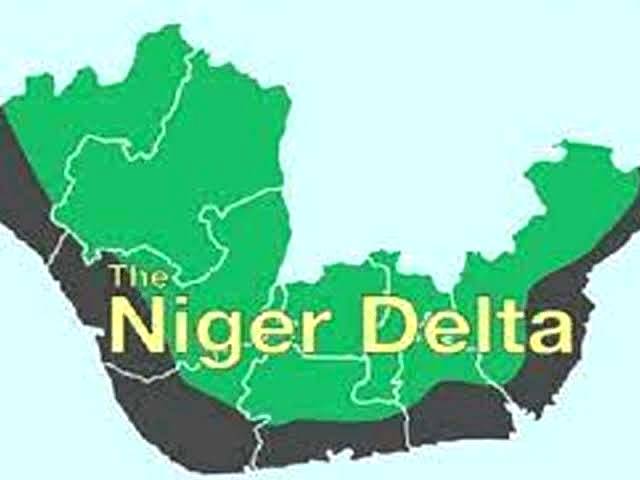
By Joseph Ebi Kanjo
Environmental activists under the aegis of Coalition for a Clean Niger Delta (CCND), over the weekend called on President Bola Tinubu “to resolve the Ecocide (Environmental Genocide) in the Niger Delta, that increasingly threatens the continued existence of the entire region.”
This is contained in a statement jointly signed by Dr. Nnimmo Bassey, Executive Director, Health of Mother Earth Foundation (HOMEF) and
Otive Igbuzor, Founding Executive Director, African Centre for Leadership, Strategy & Development (Centre LSD), and made available to INFO DAILY.
According to the duo, to address the ‘environmental genocide’ in the region, President Tinubu needs to urgently issue an “Executive Order creating a Niger Delta Environmental Remediation Programme and Trust Fund.”
READ ALSO: Oil Spill: Pay A Visit To Impacted N’Delta Communities, Environmental Activists Urge Tinubu
CCND said the Trust Fund, when established, could either be an independent body or or “domiciled in the extant Hydrocarbon Pollution Remediation Project (HYPREP) currently overseeing the cleanup of Ogoni Land, but with a separate Trust Fund from the Ogoni Trust Fund, an expanded Governing Council and an unimpeachable Management system designed to avoid the contradictions that have historically bedeviled HYPREP and the debatable progress of the Ogoni Cleanup.”
Outlining tasks of the Trust Fund, the environmental activists said “the Programme would include a definitive health audit besides the standard environmental audit of impacted areas.
“Adoption of the National Principles on Divestment and Decommissioning in the Nigerian Oil Industry in line with the one recently compiled by a wide coalition of community, civil society and international organizations, following extensive field missions and engagements in the Niger Delta.”
READ ALSO: Three Suspected Pipeline Vandals Caught In Edo
The duo, while stating that the Trust Fund would serve as a panacea for Oil theft and asset vandalisation, added that it would “minimize re-pollution, optimize production and abate associated insecurity, enact a carefully articulated approach to this economic crime (based on broad and in-depth stakeholder consultations, which we are prepared to be part of if required).”
They added: “The new strategy should be preventive, proactive, inclusive, accountable, and look beyond current official reliance on state and non-state military methods that can often be tragically counterproductive, as results have shown intermittently.”
On how to fund the Trust Fund, the environmental activists recommended that “the primary funding should be from the operators and JV partners in oil/petroleum leases, based on credible costings for remediation within their respective acreages and in line with the universal Polluter Pays Principle (PPP).”
They added: “Additional funding sources could include (I) the Environmental Remediation Fund created but yet to be operationalized under the Petroleum Industry Act, (II) gas flare penalties paid by operators, (III) part of the existing Ecological Fund, at least to cover immediate region wide impact and cost assessments, (IV) a portion of the statutory funds of the Niger Delta Development Commission, whose statutory mission expressly includes an ecological/pollution resolution mandate that is largely neglected since its inception, (V) Decommissioning liabilities and restoring funds in oil mining agreements and (VI) international environmental, climate and impact funds/resources that can be leveraged through appropriate strategies and channels.”
News
Oil Spill: Pay A Visit To Impacted N’Delta Communities, Environmental Activists Urge Tinubu
Published
1 hour agoon
April 27, 2024By
Editor
By Joseph Ebi Kanjo
Environmental activists under the aegis of Coalition for a Clean Niger Delta (CCND), weekend, urged President Bola Tinubu to visit communities impacted by oil spill and pollution in the Niger Delta region.
Dr. Nnimmo Bassey, Executive Director, Health of Mother Earth Foundation (HOMEF) and
Otive Igbuzor, Founding Executive Director, African Centre for Leadership, Strategy & Development (Centre LSD), made the call in a statement made available to INFO DAILY.
They lamented that for over seventy years, the ecosystem of the Niger Delta has been “plagued by unprecedented perennial pollution from petroleum production activities, enabled or worsened by a highly dysfunctional, conflicted and compromised environmental regulatory system, since the country struck commercial oil in the Oloibiri Province prior to Nigeria’s Independence.”
The environmental activists, while advocating for the clean up of the region particularly impacted communities, said Nigeria, being a member of international treaties and conventions, including those on universal rights, environmental and indigenous people’s rights, and climate change, cannot be a difference from other oil producing nations.
READ ALSO: Cultists Arrested For Invading Anambra Hotel With Charms
The statement partly reads: “We invite Mr President to pay a spot visit, along with the relevant Ministers and Regulators, and possibly the National Security Adviser, to some of the following locations, which are too few as examples of devastation, to see for yourself: Polobubo and Ogulagha in Delta State; Ibeno, Mbo and Ikot Ada Udo in Akwa Ibom State; Awoye in Ondo State; Bille, Obagi and Rumuekpe in Rivers State; and Gbarain/Ekpetiama, Nembe,Aghoro and Otuabagi (where Nigeria’s pioneer oil wells are located) in Bayelsa State.
“Amidst the global dynamics of the 21st Century, and particularly in the context of climate change/action, Nigeria cannot continue to act as if ignorant of the importance of its biodiversity endowments and ecological imperatives.
“There are many countries we can benchmark, which produce more oil, gain far higher revenues from it, but still jealously and profitably protect their environment and ecosystems. Norway which has a trillion-dollar Sovereign Wealth Fund from petrodollars (and population of 5.5 million, against Nigeria’s 228 million) is a prime example, but ensures its waters stay pristine, enabling its robust fishing and marine industries. Scotland and the UAE are others.
“We trust that Mr President and the government are mindful of Nigeria’s numerous commitments to international treaties and conventions, including those on universal rights, environmental and indigenous people’s rights, and climate change.
READ ALSO: Three Suspected Pipeline Vandals Caught In Edo
“Mr President’s commitments to a world audience at the UN Climate Conference (COP 28) in Dubai, UAE, barely four months ago are also fresh in mind.”
The statement added: “A genuine action to cleanup the Niger Delta will be an excellent progress report for Nigeria, and particularly for Your Excellency, as the world gathers again at the next Climate Conference, COP 29, in about six months from now.
“The protracted social injustice of funding national development at such extreme ecocidal expense of communities in the oil-producing Niger Delta region, or communities wherever else in Nigeria, needs to be urgently redressed, without any pretences as witnessed under previous Administrations.
“With the ongoing divestment of their remaining onshore holdings in Nigeria by the major international oil companies (IOCs), and their huge outstanding environmental liabilities thrown into legal uncertainty, thereby portending further risks and escalation of social tensions for communities, the time for Mr President to act as the Protector-in-Chief of Nigerian communities is now.”
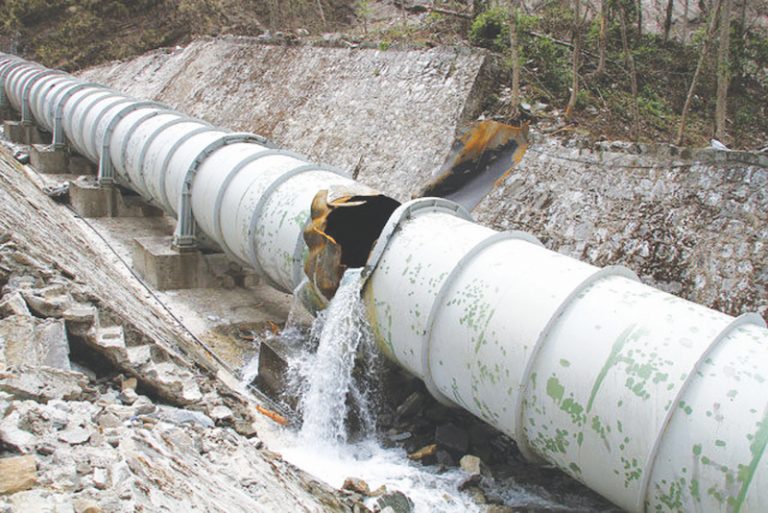
The Edo State Police Command has arrested three pipeline vandals in the Obazagbon community of the Orhiomwon Local Government Area.
The suspects include Jackson Aluche, aged 45; Oke Okoro, aged 30; and Oluchukwu Chukwuma, aged 18.
It was gathered that the incident occurred on April 14 at about 10:30 a.m.
READ ALSO: Kanye West To Launch Yeezy P0rn Studio With Stormy Daniels
When contacted by our correspondent, the state Police Public Relations Officer, Chidi Nwabuzor, confirmed the incident.
He added that the suspects were caught siphoning crude oil and smashing a PAN Ocean Oil Corporation pipeline.
Nwabuzor noted that the suspects admitted to the crime, claiming that one AKA Doctor had hired them to carry out the deed and that they would be charged with court charges.
READ ALSO: Two Fake Police Inspectors Arrested In Edo
He said, “On April 14, 2024, at about 1030 a.m., the operatives of the State Criminal Investigation Department, while acting on credible intelligence, arrested three suspects, namely, Jackson Aluche, 45 years old; Oke Okoro, 30 years old; and Oluchukwu Chukwuma, 18 years old, at Obazagbon community in Orhiomwon Local Government Area of Edo State.
“They were caught breaking a crude oil pipeline for Pan Ocean Oil Corporation and siphoning crude oil. The suspects made statements and confessed to the crime, saying that they were employed by AKA Doctor to carry out the act. Suspects will soon be charged in court.”

Pollution: Activists Want N’Delta Environmental Remediation Trust Fund Established

Oil Spill: Pay A Visit To Impacted N’Delta Communities, Environmental Activists Urge Tinubu

Three Suspected Pipeline Vandals Caught In Edo
Trending

 Entertainment5 days ago
Entertainment5 days agoBridesmaids’ Dance At Wedding Causes Stir On Social Media [VIDEO/PHOTOS]

 Metro5 days ago
Metro5 days agoVIDEO: ‘UNN Lecturer’ Caught Pants Down With Married Student

 News3 days ago
News3 days agoDrama! Supporters Of Yahaya Bello Perform Rituals to Prevent His Arrest By EFCC [Video]

 Headline3 days ago
Headline3 days agoDrama As Women Fight Dirty, Breasts Fall Out During Spring Break Outing In US [PHOTOS/VIDEO]

 News3 days ago
News3 days agoVIDEO: Force PRO Orders Arrest Officers Caught On Video Bashing Driver’s Car

 Entertainment3 days ago
Entertainment3 days agoNollywood Actor, Zulu Adigwe Is Dead

 Headline3 days ago
Headline3 days agoMeet 17-year-old Nigerian Who Won $3.5m Worth Of Scholarships From Harvard, 13 Other Foreign Universities

 Metro3 days ago
Metro3 days agoEdo Cultists Kill Rival In Daughter’s Presence, Abandon Getaway Car

 News5 days ago
News5 days agoIGP, Jonathan Disagree Over State Police

 Headline4 days ago
Headline4 days agoVideo Of Girl Being Bullied, Slapped At Lead British School Sparks Outrage Online [PHOTOS/VIDEO]


